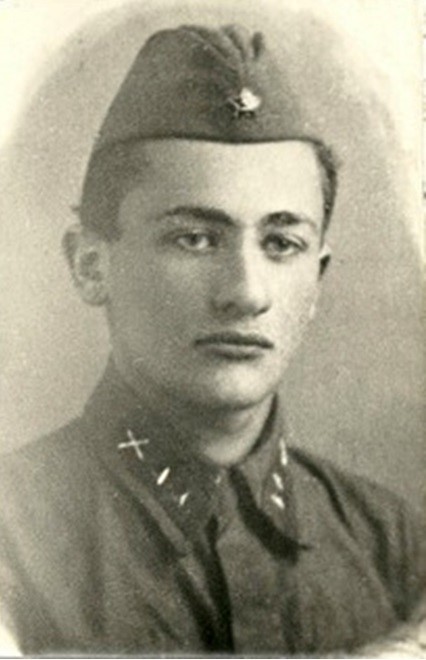Lev Eksler was born in 1922 in Verkhnedneprovsk, in Eastern Ukraine. In 1930, he moved to Leningrad (now St. Petersburg, Russia). With the beginning of the Soviet-German war in June 1941, Eksler volunteered to join the Red Army despite the fact that he had an exemption from military service (due to an illness of the spine). In July 1941, Eksler was assigned to the 3rd Rifle Division of the Leningrad civilian militia, which was to fight in the North. According to his estimate, Jews constituted 10% of the division. Eksler became a communications man of an artillery battalion. At the end of August 1941, Eksler was shell shocked and sent to a military hospital.
After his release, Eksler was transferred to take part in the defense of Leningrad. His military rank was raised – to that of sergeant -- and he was made commander of a communications unit of an artillery battalion. The fall of 1941 was a time of retreat for the Red Army. Men in Eksler's division began to desert.
"Soldiers said openly: 'What are the Germans to us, we have already worked to the point of exhaustion [under the Soviets], [under the Germans] we will work the same way, the hell will be the same." I remember one deserter […] saying: 'Let the Jews fight, there are a lot of them here [in the division]'" – Eksler recalled in 1990.[1] However, despite great losses of personnel, Eksler's division continued to fight. In November Eksler suffered three wounds simultaneously. He spent the winter in a military hospital in Novosibirsk, in Siberia and was then released from army service.
However, within a short time Eksler went to the command of the Novosibirsk military district and asked to be sent back to the frontlines. "They read my [release] letter from the hospital at looked at me as like I was an idiot" – Eksler noted. Nevertheless, they sent him on to the local enlistment office. There the chairman of the commission asked Eksler only one question in reaction to his German-sounding name: "Are you German by origin?" When the answer was an unambiguous "No!," the chairman accepted him into the Red Army and sent him to an artillery school.
In August 1942 Second Lieutenant Eksler was sent to the Voronezh Front as the commander of a howitzer platoon. The Stalingrad operation was commencing and he went on to fight German, Hungarian, Italian, and Romanian troops that were attempting to advance eastward. During this period Eksler was awarded the Order of the Red Banner.
In February 1943, while repulsing an enemy tank offensive with his howitzer platoon, Eksler was seriously wounded. He underwent a number of operations, and had to leave the army. In 1943-1944 he lived in Novosibirsk. After the war, he returned to Leningrad, where he simultaneously worked and studied at a teachers' seminary. Then he was a chemistry teacher.
In the 1990s Lev Eksler moved to Israel, where he died in 2001.
Lev Eksler's remarks about Jews in Hungarian labor battalions who surrendered to the Soviets in the winter of 1942-1943
"The Romanians [Eksler's mistake: there were labor battalions in the Hungarian, not the Romanian army] had one battalion of unarmed Carpathian Jews, equipped only with shovels for digging trenches and graves. They were wearing greatcoats without shoulder straps …. I learned about these Jews, when about fifteen men (all middle-aged) began to run over to our side and surrender to me. They expressed great joy, apparently recognizing me as a Jew, and spoke to me in Yiddish (which I did not understand) and then in Polish, Ukrainian, and Russian. They referred to themselves as "karpatishe aidish [sic]" [Carpathian Jews]. "At last we have reached the Russians, our liberators and are saved from certain death" said those unfortunate people, most of whose relatives had been murdered.
I sent the Jews to the rear with one Ukrainian soldier. When he returned, he said to me 'Listen, Lieutenant, our men killed all of your Jews on the way. I tried to explain to them that they [the Jews] had run over to our side, but they [the Red Army men] said that this meant that they were serving both us and them [the enemy]. I couldn't do anything [to save the Jews.]' The Ukrainian soldier was ashamed and apologized to me."[1]
[1]Ocherki evreiskogo geroizma, vol. 3. Kiev, 1997, pp. 153-154.
On wartime antisemitism
"In Buguruslan [the town in the Urals where Eksler was hospitalized] and in Novosibirsk I witnessed an outbreak of antisemitism. The myth that "the Jews do not fight but are only found in the rear" was widespread. "The Jewish partisans occupied three cities in the rear of the enemy – Tashkent, Novosibirsk and Alma-Ata" was a joke that circulated in the hospital in Buguruslan and was greeted with almost universal approval. In the fall of 1943 in Novosibirsk, Jewish secretaries of district and local Party committees began to be removed (the directors of the factories were not removed until the end of the war).
To the vile charge that "the Jews do not fight" (this myth had been spread by fascist propaganda from the very beginning of the war), I had a convincing answer: my wounds and my awards for fighting. I could also tell them how my ancestors had fought for Russia."
[1] From an interview taken by Semion Uzin, published in Ocherki evreiskogo geroizma, vol. 3. Kiev, 1997, pp. 150-155.







